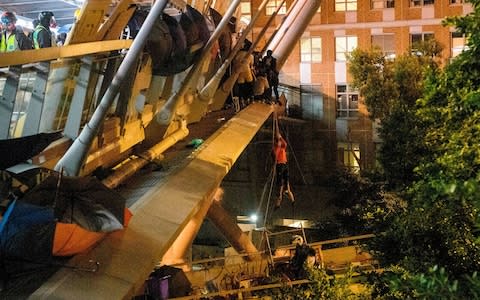Hong Kong protesters attempt daring escape down ropes as police seal off university

Protesters in Hong Kong staged a daring breakout from a university besieged by police last night as parents pleaded with authorities to spare the young activists, some of them high-school students, who remain inside.
The escape came as police said Hong Kong's Polytechnic University had turned into a "powder keg" and student leaders accused authorities of creating a "humanitarian crisis" inside the campus.
Earlier on Monday the besieged protesters, who are running low on supplies and fear the consequences of an all-out police assault, mounted an attempt to break out in force, but were beaten back by tear gas.
Thousands of protesters streamed towards the campus in an attempt to break the siege from the outside, and clashes broke out with police in nearby Kowloon.
In the evening, several dozen black-clad protesters used a rope to slither down several metres on to a motorway below where they were picked up by waiting motorcyclists. It was unclear how many remained inside.
This was probably the most surreal thing I have ever witnessed in the Hong Kong protests. Protesters just attempted a daring escape through a bridge at Polytechnic University. Volunteers on motorbikes came in drives to drive them out asap. Police fired teargas. #HongKongProtestspic.twitter.com/huhSo3Mxo9
— Michael Zhang 張雨軒 (@YuxuanMichael) November 18, 2019
Meanwhile, a group of parents unfurled a banner near the police cordon outside the campus saying "Save Our Kids."
Hundreds of protesters including high school students have been trapped inside Polytechnic University since activists seized and fortified it late last week, saying it was their last refuge from police brutality against the pro-democracy activist movement.
The campus became a battlefield over the weekend when protesters used petrol bombs, bricks and arrows to repel police armored cars and water cannon trying to enter the campus. Student leaders now say they are suffering from siege conditions and fear for their safety.

“Hong Kong police are creating a humanitarian crisis inside PolyU,” Ken Woo Kwok-wang, acting president of the student union, told a Hong Kong newspaper. “We are trapped. There is insufficient food and the number of injured is on the rise, and the hygiene situation is getting worse."
Police have described the campus as a “weapons factory,” saying they had received a report that several toxic and dangerous chemicals, including highly volatile explosives, had been stolen from a laboratory.
“We must warn that the university campus has become a powder keg where danger is far beyond what we can estimate,” said Kwok Ka-chuen, a police chief superintendent.

“Hong Kong’s rule of law has been pushed to the brink of total collapse.” Cheuk Hau-yip, the commander of Kowloon West district, where Polytechnic University is located, said the police had the resources to end the siege and said those inside would be arrested.
"Other than coming out to surrender, I don't see that there's any viable option for them," he said.
Authorities, meanwhile, were dealt a setback Monday when Hong Kong's high court struck down a contentious ban on wearing face masks in public imposed last month, ruling it unconstitutional.
Protests have disrupted Hong Kong continuously for nearly six months.
They first kicked off against a now-withdrawn extradition proposal, though sentiments have pivoted to target the police, who protesters accuse of brutality, and more broadly, China, over concerns that Communist Party rule is eroding freedoms in the former British colony.
As clashes escalated significantly over the last week, forcing schools to shut, fears have grown that China may again call on military reinforcements to restore order, a move that would recall the Tiananmen Square massacre in 1989 when soldiers fired on peaceful student demonstrators.
Speculation mounted further after Chinese troops stationed in Hong Kong were spotted in the streets over the weekend cleaning up protest sites, an act authorities have said was voluntary.
Police have arrested nearly 4,500 people, aged 11 to 83, since protests kicked off in early June.
They have been detained for unlawful assembly, possession of offensive weapons, arson, and taking part in a riots – a serious charge that carries a maximum of ten years in prison.
About 150 of those arrests were made over the weekend. As the university deadlock continues, former British foreign secretary Malcolm Rifkind urged Hong Kong authorities to exercise restraint.
“A bloodbath on a Hong Kong campus would be devastating,” he said in a statement issued by Hong Kong Watch, a UK-based advocacy group. Hong Kong leader Carrie Lam “has the responsibility to do everything possible to prevent a massacre.”
Additional reporting by Yiyin Zhong


